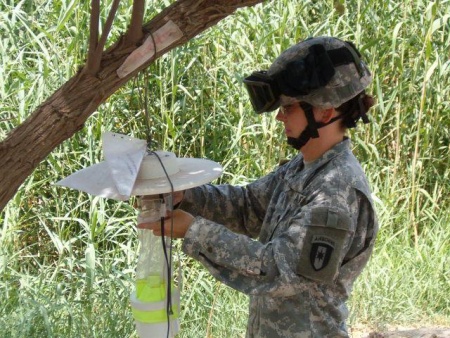By Mass Communications Specialist 1st Class Amy Kirk, Continuing Promise 2015 Public Affairs
COLON, Panama (NNS) – The preventive medicine team, embarked aboard the Military Sealift Command hospital ship USNS Comfort (T-AH 20), was on the hunt for Aedes aegypti and Aedes albopictus mosquitoes during a subject matter expert exchange (SMEE) in support of Continuing Promise 2015 (CP-15) on June 6.
Lt. Cmdr. James Dunford, an entomologist assigned to Navy Environmental and Preventive Medicine Unit 2, Norfolk, Virginia, and preventive medicine technicians worked alongside Panamanian host nation counterparts to conduct mosquito surveillance.
“One of our overall goals is to reduce the mosquito population in an effort to slow down the infection rates of the diseases they carry,” said Hospital Corpsman 1st Class Luke Peet, a preventive medicine technician assigned to Joint Expeditionary Base, Little Creek, Virginia. “Mosquitoes carry a wide variety of diseases in this region. There is a real concern about the spread of dengue fever, chikungunya, and malaria.”
Peet explained that the preventive medicine team is working closely with vector control teams from the Ministry of Health in each country during the CP-15 mission. They discuss mosquito surveillance and control activities and how each host nation carries out public information campaigns to educate people about mosquito-borne diseases.
“Once we have their information, we share ways in which the U.S. conducts vector control, and discuss some of the tools necessary to properly survey for dangerous species of mosquitoes,” said Peet. “We like to spend a few days with the country’s vector control teams to conduct a classroom portion and then travel outdoors, working side-by-side to trap and examine mosquitoes.”
Dunford said the SMEEs go a long way in establishing open lines of communication between host nations and the United States, allowing them to work together and share ideas about mosquito control solutions, while building long-term bonds.
“These mutual exchanges have been very beneficial because our team gains a better understanding of the techniques they use and challenges they encounter. As it turns out, we face many of the same challenges,” said Dunford. “Our broader goal is to promote on-going collaborative efforts to better understand mosquito biology and emerging infectious diseases.”
In addition to Panama, the team has conducted SMEEs in Belize, Guatemala, Jamaica and Nicaragua, covering topics on mosquito surveillance and control, mosquito pathogen testing, and insecticide resistance monitoring. Additional exchanges are planned for the remaining mission stops in Dominica, Dominican Republic, Honduras, Colombia, El Salvador and Haiti.
Continuing Promise is a U.S. Southern Command-sponsored and U.S. Naval Forces Southern Command/U.S. 4th Fleet-conducted deployment to conduct civil-military operations including humanitarian-civil assistance, subject matter expert exchanges, medical, dental, veterinary and engineering support and disaster response to partner nations and to show the United States’ continued support and commitment to Central and South America and the Caribbean.
For more news from Continuing Promise, visit www.navy.mil/local/cp/.
